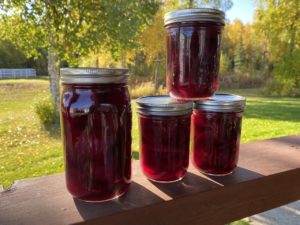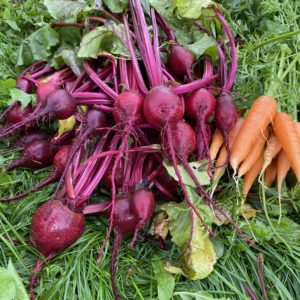Beet Therapy

It is harvest time here on our little farm; the garden is at the end of its season. Carrots have been pulled, blanched, and put up in the freezer. Today the task is to process beets. I’m grateful for the work because it pulls me away from the news that 1,095 Alaskans were diagnosed with Covid-19 in one day this week, shattering the record of the pandemic to date. Alaska’s largest hospital announced it is implementing crisis standards of care and rationing medical care —forcing providers to prioritize in favor of those most likely to recover.
I scrub the beets until my hands are raw from the stiff brush and cold water. I had thought to start writing a blog about “ordinary time” after the past eighteen months of this pandemic. For a while in early summer it seemed we might be on the way to getting this virus behind us. That clearly was wishful thinking.
I place the beets in a large kettle, fill it with water, and set the pot on the stove to cook. Soon the kitchen fills with the warm scent of earth. Earlier in the summer, I placed the hard kernels of beet seeds into the soil, covered and watered them, and then waited. In about twelve days twin leaves sprouted in several long, straight rows. The more the leaves grew, the more sunlight, warmth and nutrients they absorbed, nourishing the root bulb below. I marvel at this process of planting and tending the crop. I’m always amazed at how a hard, seemingly dead seed can be brought to life by soil, sunlight, and water, and how it then gives and sustains life after the harvest.
I am also amazed how the circle of our family reflects in many ways the dismay and deep division of our nation. While some in our family express paranoia about our scientific, educational, and government institutions, others in our family who work in healthcare are overwhelmed, exhausted, and angry by what they perceive as the rejection of those same institutions and knowledge. The window of opportunity we had to eradicate, or at least control, this disease has passed us by. It seems we will now live and die with the virus in our midst. The number of Americans who have died of the disease is quickly approaching the number of those who died from the Civil War, nearly 670,000 to date.
Civil war. The ugly vitriol of our times is beyond anything I’ve seen in my lifetime. This past weekend we saw three large trucks each with two flags flying. One flag was an American flag. On the other, printed boldly in black and white, was an expletive toward the current administration. Freedom of speech these days does not reflect a free exchange of ideas so much as the freedom to hurl insults and profanity.
The beets are cooked, and I dump the steaming kettle into the sink. After they drain I plunge them into ice-cold water. As they cool, I slide their warm skins off with my hands. The beets now look like small hearts, red and slippery.
I wonder what has become of our hearts, that we cannot find it in ourselves to collectively care for our neighbors, our communities, our earth? My heart is so heavy some days, it feels like an anvil in my chest. My sister’s friend died of Covid-19 yesterday. Another friend from our church died the same day. How do we mourn when division and strife add to our grief, day after day after day?
The pot I used to cook the beets has since boiled the jars for pickling. The scent of earth in the kitchen has been replaced by hot vinegar brine. I cut up the beets, put them into the sterilized jars, and pour over the brine. The kitchen is moist with humidity. I slide open a window and breathe in the cool fall air. Outside my window, birch leaves have begun to shimmer shades of yellow. After sealing the jars, I put them back into a water bath to boil for ten more minutes. Meanwhile, I set another pot to boiling while I prepare the beet greens for blanching.
This ritual of the harvest is a comfort somehow. My mother and grandmothers had gardens and every August and September we spent time shoulder to shoulder at the stove and sink. It is just as nourishing now as it was then to watch shelves being filled with sustenance for the coming winter. Generations ago it was a matter of survival. Today it is a ritual of constancy, a task as sure as the seasons, something to count on. And in some odd way, it is an act of hope that our divided family will someday gather around the table, break bread, and consume the harvest together.


Lovely writing and thoughts as always Kaylene.
Like you, our family adores beets- hot beet soup, cold beet soup, beets with herring, shredded beets with onions, etc
Ode to beets.
Thank you, Asta! Mmmm. Maybe another blog will feature recipes!
Wow. What a beautifully well written read. I can’t wait to read “Canyons & Ice” about Dick. I’m sure your words brought wonder and adventure into the heart of thousands. And to think all from one amazing man’s relentless journey!
Thank you, Rachel. I think you’ll enjoy the book!